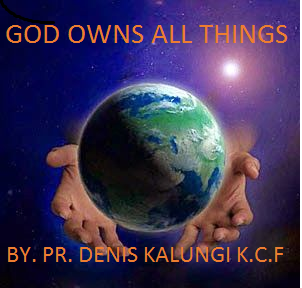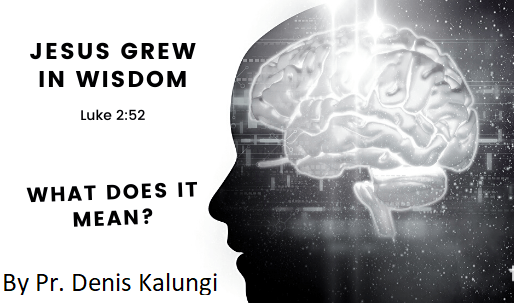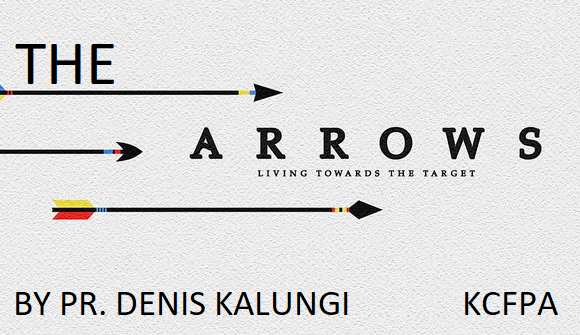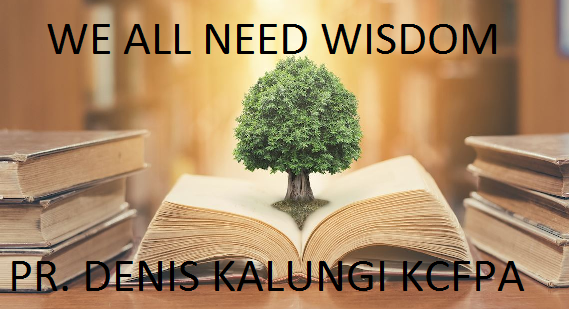PR. DENIS KALUNGI DENIS KIREKA CHRISTIAN FELLOWSHIP
15TH/10/2021/ SERMON
GOD OWNS ALL THINGS.
Ownership involves recognizing that all things ultimately belong to God that He entrusts us with resources and responsibilities to steward for His glory and that yielding our rights and expectations to Him helps us resolve irritations, anger, and worry, to have this full view or assessment below are some principles!
We are stewards. God expects us to be stewards of what He has entrusted us with. The Bible speaks quite often about stewardship {Mathew 25: 21-29, 1 Cor 4:7}, so what does the world steward mean? It is from the Greek word “oikonomos” and means “the manager of the household,” so does the steward own the house? No, the householder owns everything in the house, including the house, so the steward is only a manager of what is in the household.
Similarly, we are stewards, not the owner, of His things, managing what God has given us, so God will expect us to be good stewards with what has been entrusted to us. Jesus will return someday to settle accounts with all of us. He says if you “have been faithful over a little; I will set you over much. Enter into the joy of your master” {Mathew 25:21} and “everyone who has more will be given, and he will have an abundance. But from the one who has not, even what he has will be taken away” {Mathew 25:29}.
Recognize that all belongs to God. As the Creator of all things, God holds the certificate of ownership for the world and all the people in it. {See Psalm 24:1–2} Christ’s ownership of His entire creation is emphasized in Colossian 1:16–17: “For by him were all things created, that are in heaven, and that are in earth, visible and invisible, whether they be thrones, or dominions, or principalities, or powers: all things were created by him, and for him: and he is before all things, and by him all things consist.”
Those who have received the gift of salvation through Jesus Christ are “doubly owned” by God since Jesus purchased their redemption through His death and resurrection.“What? Or do you not know that your body is the temple of the Holy Spirit who is in you, whom you have from God, and you are not your own? For you were bought at a price; therefore glorify God in your body and in your spirit, which is God’s {I Corinthians 6:19–20}.
Understand the responsibilities of stewardship. God is the Creator and Owner of all things, and along with the good gift of life, He entrusts resources to each person, including time, talents, relationships, and abilities. With every gift of God comes the responsibility to be a faithful steward of those resources.
For example, when granted the gift of family, a husband is responsible to love his wife and a wife is responsible to reverence her husband. Parents are responsible for training their children and caring for their physical, educational, emotional, and spiritual needs. Children are responsible to honor and obey their parents and other elders.
In all things, we are to fulfill our responsibilities for the glory of God Apostle Paul has this to say. “Whether therefore you eat, or drink, whatsoever you do, do all to the glory of God” {I Corinthians 10:31} whiles king Solomon emphasis committing all our plans in the hands of the creator see it herein {proverbs 3:5-6}.
Identify personal rights and expectations. In the areas of life where we have responsibilities, we also have personal rights and privileges—things we believe we deserve. Personal rights affect every facet of life: self, family, friends, knowledge, health, reputation, schedule, plans, dating, money, clothes, music, activities, possessions, and so on but remember {1 Timothy 6:7}: “We have brought nothing into the world, so we cannot take anything out of it either.”
Based on these rights, we construct expectations of others and circumstances. Just because you are alive, you probably believe you have the right to be accepted as an individual, to express opinions, to earn and spend a living, to control your personal belongings, and to make decisions.
You expect others to respect your rights and act in a way that fulfills your expectations. Consequently, we often overlook God’s ultimate ownership of all things and begin to take a personal interest in seeing that our rights and expectations are fulfilled. Then, instead of seeing rights and expectations as privileges and blessings that we might or might not receive, we cling to them selfishly and we forget {Job 41:11}: “Whatever is under the whole heaven is mine.” Says the Lord.
When we don’t get something we think we deserve, our pride is wounded—anger and worry are our natural responses. Expectations are especially damaging within a family since people tend to expect more of family members than they do of other people. They also may expect to “get away with” failing to fulfill responsibilities because of the family relationship.
A selfish focus sets us up for conflicts. “Only by pride comes contention” (Proverbs 13:10). We become more concerned about defending our rights and expectations than we are concerned about fulfilling our responsibilities. When offenses arise, the other party may feel justified in his actions, based on expectations of his own that we failed to fulfill—because we were not faithful to our responsibilities.
When Jesus uses the Aramaic term mammon to refer to wealth, he is giving it a personal and spiritual character. When he declares, “You cannot serve God and mammon” {Mathew 6:24}, he is personifying mammon as a rival god. “Mammon is a power that seeks to dominate us.”
Giver of all things. Jesus once said that “a person can receive only what is given them from heaven” {John 3:27}, so there is nothing we have that we did not receive from God. All we have has been given freely by God, Who is the Titleholder to all created things. That means that He is the absolute and undisputed owner of everything that everyone has; whether they acknowledge it or not doesn’t matter. God says, “I know all the birds of the hills, and all that moves in the field is mine” {Psalm 50:11}
If I came over to your house and you were hungry, what would prevent you from eating something in your own home? Nothing would. That’s because you own all the food in your refrigerator and your cupboards. Similarly, God owns all the foods, all the homes, all the workplaces, all things in all places, and there is no doubt that He holds the title to your home, your car, your bank account–everything, in fact, including you!
Yield rights and expectations to God. Only as we yield our rights and expectations to God are we free to focus on fulfilling our responsibilities. God is not interested in giving us what we “deserve” as he is in control and e is the Owner of all things and that He can work all things together for good.
He may choose to withhold something you expected to receive to help you grow in maturity or to reveal more of Himself to you. By yielding our rights to God, we can respond to life with patience and teachable hearts{2 peters 3:9}
In Scripture, we are challenged to thank God in all things. When you surrender your expectations to God, you’ll have new freedom to rejoice in all circumstances, knowing that God is in charge and that He will take care of you.
Surrendering your rights and expectations to God opens a whole new capacity for gratitude in your life. After all, if someone does something for you that you are expecting, you may not feel obligated to express gratitude. However, if you are not expecting anything, you will be delighted and your gratitude will bless others.
Without our God, we would be bankrupt corpses. All that we have is His. We are born into this world with our hands empty, and we leave this world not only with empty hands but wearing clothing without pockets. When you stop to think about it, our souls have no pockets either. We take nothing with us. God owns it all.
John Wesley put it this way, “When the Possessor of heaven and earth brought you into being and placed you in this world, he placed you here not as a proprietor, but a steward.”
Stewardship is managing God’s treasures in God’s way, for God’s purposes, and always for God’s glory. We begin life with our hands wide open and nothing in them. As we mature, by the grace of God, He allows certain things to be placed into our possession, none of them under our ownership. Remember, He owns everything in heaven and earth. It’s all His. My fellow pastors your stewards and you will have to give accountability be blessed.









0 comments
LEAVE A REPLY